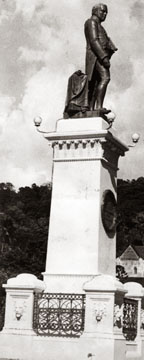|
observer |
|
|
|
|
|
OTHER LINKS |

|

|

|
Re- erect Ward statue
It was the opinion of the British Colonial Secretary for the Colonies that, if the British possessions in the Orient and the Far East were to be retained, Ceylon should be retained and the people of Ceylon should have some beneficial improvement in the internal development and the infusion of democratic principles. Governor Ward was an ideal choice, who was an ex-Liberal MP of UK Parliament. Sir Henry Ward was the first Governor who took all matters to improve the paddy cultivation and farming and encouraged the local farmers to improve their methods of paddy cultivation. The irrigation system that prevailed during the Sinhala kings appeared to him as a methodical system. Irrigation Ordinance No. 9 of 1856 read as "An Ordinance to facilitate the revival and enforcement of Ancient customs regarding irrigation and cultivation of paddy lands." It was during his time that Government Agents of Provinces were instructed to get the cooperation of the common people. Irrigation lands in the North Central Province, Uva, Central Province, North-western Province and the Eastern Province were improved. The Irrigation Department was started in the year 1856. Bailly's Irrigation Report was accepted and Irrigation Schemes were improved in the Uva and Eastern Provinces. The Padaviya, Tamankaduwa and Kantale tanks were his main objects of improving, and around them settled the people from Hatara Korale and Siyane Korale, as the N. C. P. had very few people to undertake irrigation and paddy cultivation. Sir Henry Ward completed the electric telegraph system which enabled contact with the Provincial areas. The up-country areas were opened up with the Railway Lines to Kandy. This was a great boon to the people residing in Kandyan areas and the English Planters who opened up tea estates which no resident in Kandy or in the Up-country could afford to forget or ignore. This great project was the enterpreneaur beginning of opening up Kandy as the centre of the plantation industry and the formation of the Kandy Municipal Council as an Institution to administer the Kandy Municipality by the Government Agent, nominated members and few elected members. When Governor Ward arrived in Ceylon, the Civil Administration was not modelled on any principle of administration, just as much as the Civil Service of Great Britain, which a M. P. of U.K. Parliament described, "The Civil Service of Great Britain was the out-door relief Department of the British Aristocracy". Ceylon at the time of Ward had few Englishmen to run the Civil Establishment. He took measures to recruit new cadres to the Civil Service and the clerks were called Writers at that time, and their pensions were regulated by rules. He built roads and public works to enable the residents of interior areas to have a close contact with Colombo and the maritime Provinces. The Bogambara Hospital was a Military Hospital where civilians had no access for treatment. He gave orders to the estate population to take treatments from the hospital. The Ward Statue was erected in front of the Kandy Lake on August 5, 1868 by the people of Kandy. And it remained at this spot for 109 years, until it was removed on 12.05. 1977. This Ward Statue had an epithet "My conscience tells me of my judgements and ability with which I have tried to do my duty by you, and it is my hope that you will think of me hereafter, as a man whose heart was in his work". This statue now languishes in the Kandy Museum Garden without this epithet. It is relevant here to state that on a suggestion by the late Mr. Hector Wickremaratne, Attorney-at-Law and MMC, the Kandy Municipal Council passed a resolution to re-erect the Ward statue in front of the Kandy railway station. This was passed unanimously at the monthly meeting in February, 1982. The then Mayor Mr. Tilak Ratnayake directed this matter to the Director of Cultural Affairs. It is hoped that this matter will be revived under the Antiquities Ordinance which empower the Ministry of Cultural Affairs to preserve this ancient monument and to locate this in the appropriate place. In this connection, the policy of the Indian Government in regard to monuments is that special committees have been appointed to re-locate the existing statues in appropriate places. The Kandy city is a heritage city. People of different cultures have their own heroes throughout human civilisation. The attitudes, impressions and values in respect of rulers, Generals, politicians and Statesmen and publicmen and philanthropists have been varied. Statesmen of one age may be called Charlatons in another age. Yet, the good deeds done by the rulers should not be overlooked by the next succeeding generation. Henry Ward was a distinguished Governor whose English Liberal views of Gladstone gave vent in Ceylon at that time, and his place in our history should be given the appropriate recognizance by the authorities. |
 Students of British Colonial history of Sri Lanka in the 19th century
could not afford to overlook Governor Sir Henry Ward 1855-1860, whose
administration had a very significant impact on the inhabitants of Sri
Lanka. After the departure of Lord Torrington as Governor, the British
Government in the United Kingdom appointed Sir Henry Ward as the
Governor to overcome a bleak administration and usher in various reforms
for the benefit of the Colony.
Students of British Colonial history of Sri Lanka in the 19th century
could not afford to overlook Governor Sir Henry Ward 1855-1860, whose
administration had a very significant impact on the inhabitants of Sri
Lanka. After the departure of Lord Torrington as Governor, the British
Government in the United Kingdom appointed Sir Henry Ward as the
Governor to overcome a bleak administration and usher in various reforms
for the benefit of the Colony. 






